Pope Francis’ prayer intention for April
Here is Pope Francis’ prayer intention for April 2017. Let us be united with him in prayer for young people.
That young people may respond generously to their vocations and seriously consider offering themselves to God in the priesthood or consecrated life.
Divine Liturgy for the coming week
Sunday, 4/02/17 Fifth Sunday of Great Lent —Commemoration of Our Venerable Mother, Mary of Egypt
9:00 a.m. +Ella Sowa requested by Walnycky family
10:30 a.m. Pro Popolo
Epistle: Heb. 9:11-14
Gospel: Mark 10:32-45, Tone 5
Monday, 4/03/17 Venerable Father and Confessor Nicetas, Abbot of the Monastery of Medicius
8:00 a.m. +Ivan and Halyna Lobay requested by Maria Lobay
Tuesday, 4/04/17 Our Venerable Fathers Joseph the Hymnographer and George of Maleum
9:00 a.m. +Mary Plaskonos (40 days, Pan.) requested by the Plaskonos family
Wednesday, 4/05/17 Holy Martyrs Theodulus and Agathopedes and companions
9:00 a.m. Liturgy of the Presanctified Gifts
Thursday, 4/06/17 Repose of Our Holy Father Methodius, Teacher of Slavs
8:00 a.m. no intention for the Divine Liturgy
Friday, 4/07/17 Venerable Father George, Bishop of Mitylene
7:00 p.m. Liturgy of the Presanctified Gifts
Saturday, 4/08/17 Lazarus Saturday —Holy Apostles Herodion, Agabus, Rufus, Asyncretus, Phlegontus, and Hermes
8:00 a.m. no intention for the Divine Liturgy
Sunday, 4/09/17 Palm Sunday —the Lord’s Entrance into Jerusalem
8:40 a.m. Lytja and the Blessing of Bread
9:00 a.m. Special Intention
Second Sunday of the Parish Mission preached by Father Robert Markovitch
Blessing of Pussywillows and Anointing
10:30 a.m. Pro Popolo
Epistle: Phil. 4:4-9
Gospel: John 12:1-18, Tone 6
Eastern Catholic Bishops meet
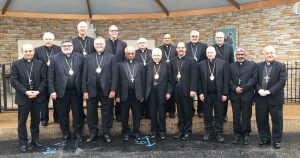 The Eastern Catholic Associates meeting 2017.
The Eastern Catholic Associates meeting 2017.
US Eastern Catholic Bishops at their semi-annual meeting at the Maronite Pastoral Center in St. Louis, MO.
Blessed Emilian Kovch
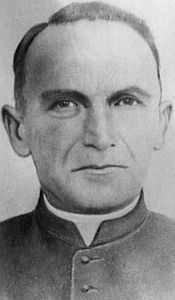 In addition to the Solemnity Annunciation celebrated today, we also have Blessed Emilian Kovch (1884-1944), a married Eastern Catholic priest and father of six who was persecuted under Communism and Nazism. Father Kovch died on March 25, 1944. He was beatified by St. John Paul II on 27 June 2001.
In addition to the Solemnity Annunciation celebrated today, we also have Blessed Emilian Kovch (1884-1944), a married Eastern Catholic priest and father of six who was persecuted under Communism and Nazism. Father Kovch died on March 25, 1944. He was beatified by St. John Paul II on 27 June 2001.
Emilian Kovch, a son of a Greek Catholic priest. Himself ordained the year following (1911) his marriage and began to work as a parish priest. Fr. Kovch spent 1919-1921 as a military chaplain. He was captured and briefly held as a prisoner of war. This time in confinement was a preview what came later.
Kovch lived a life of Christian virtue in his care for orphans and the poor, teaching, working for social and political liberty, he preached respect for others at all times, and he preached on the duty to fight anti-Semitism. He was a organizer of Eucharistic congresses and pilgrimages.
On the point of anti-Semitism, Father Kovch acted heroically when he placed himself in harm’s way when he protected the local synagogue by blocking the entry of soviet soldiers from entering.
Kovch’s social engagement gained the attention of the government, especially the Polish and later soviet leaders that made him vulnerable to the intrusive games of the military when they searched his home 40 times; and on at least one occasion he was fined and imprisoned in a monastery. Father Kovch preached passionately against the actions of his fellow Ukrainians taking anti-Polish actions; it is said he was deeply disappointed that his people looted Polish homes when the Soviets came.
Father Kovch was arrested at what turned out to be the near-end of Soviet oppression. The priest and his two daughters escaped; history reveals that all the prisoners in their group had been murdered by the Soviets as the Nazis approached. As the only Catholic priest in his group of prisoners, he became a source of strength and light in a very dark time. When his family attempted to have him released, he begged them to leave him there:
I understand that you are trying to get me released. But I beg you not to do this. Yesterday they killed 50 people. If I am not here, who will help them to get through these sufferings? They would go on their way to eternity with all their sins and in the depths of unbelief, which would take them to hell. But now they go to death with their heads held aloft, leaving all their sins behind them. And so they pass over to the eternal city.
May we follow the excellent example of Blessed Emilian Kovch. May he intercede for us when we face discouragement and the temptation to abandon the practice of Catholic faith.
Fourth Sunday of Great Lent
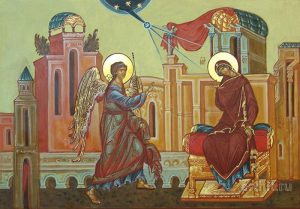 This weekend we are celebrating the mystery of our Lord’s accepting human nature for our salvation. The Archangel Gabriel asks Mary to receive God’s plan and become the mother of the Son and Word of God, to be named “Jesus,” “Savior.” Mary replies, “Behold, I am the handmaid of the Lord. May it be done to me according to your word. (Luke 1:38)” Mary’s response to God was perfect and reversed the sin of Eve. In our Lenten journey, we are asked the same question by God, “Can you be perfectly obedient to my will.” This is not to put us into slavery, but to free us from the power of sin and death. Jesus gave the power to cast out evil to his followers, but in this Sunday’s Gospel, a distraught man who has a son possessed by a demon, comes to Jesus and laments, “I asked your disciples to cast it out and they were not able. (Mark 9:18)” Jesus immediately tells the man it is because of their lack of faith, “O faithless generation, how long am I to be with you? (Mark 9:19)”
This weekend we are celebrating the mystery of our Lord’s accepting human nature for our salvation. The Archangel Gabriel asks Mary to receive God’s plan and become the mother of the Son and Word of God, to be named “Jesus,” “Savior.” Mary replies, “Behold, I am the handmaid of the Lord. May it be done to me according to your word. (Luke 1:38)” Mary’s response to God was perfect and reversed the sin of Eve. In our Lenten journey, we are asked the same question by God, “Can you be perfectly obedient to my will.” This is not to put us into slavery, but to free us from the power of sin and death. Jesus gave the power to cast out evil to his followers, but in this Sunday’s Gospel, a distraught man who has a son possessed by a demon, comes to Jesus and laments, “I asked your disciples to cast it out and they were not able. (Mark 9:18)” Jesus immediately tells the man it is because of their lack of faith, “O faithless generation, how long am I to be with you? (Mark 9:19)”
Mary’s obedience to God was perfect, and she gave birth to salvation, our obedience is not perfect, and so we are unable to cast out evil from our lives. Why is this? It may be because of weakness, that we are not strong enough to keep God’s law, and are in need of his strength through grace. It may be that we do not fully understand God’s will, and mix up our own desires with it. In any case, our Lord asks us to become more faithful in the second half of the Great Fast, since “this kind cannot be drive out by anything but prayer and fasting.” This is true faith.
Parish announcements for the week
Glory to Jesus Christ
Pysanka—Ukrainian Easter Egg Workshop: The workshop will be held on Sunday April 2, 2017 in the church hall from 1:00 to 3:30 p.m. It is open to youth and adults, but children must be accompanied by an adult. Bring your children and grandchildren to learn their heritage. Free to parish youth and Ridna Shkola students.
See flyer for details or call Gloria Horbaty (203) 269-5909 for information. Sponsored by: UNWLA, Branch 108, the Heritage Center and the CT Ukrainian American Historical Society.
The Knights of Columbus Blessed Andrey Sheptysky will hold its next regular meeting on Monday, April 3, 2017 at 7:00 p.m. in the church hall. All men of parish are invited to attend to see what the Knights are all about and what can do for our parish.
The Ukrainian National Association, Branch 414-New Haven, will hold their 14th Annual EASTER EGG HUNT on Palm Sunday, April 9, 2017 at 12 noon on the church grounds. For information see flyer (at church door) or contact Gloria Horbaty at (203) 269-5909.
Next Pyrohy Project Saturday: April 8, 2017. We need your help also on Friday, April 7, 2017 to peel potatoes. Please come and help. See Walter Ushchak for more information.
Parish Mission II: On Sunday April 9 , we will have Father Robert Markovitch giving a Mission in our parish. I would like to see all of our parishioners participate in this Mission in order to prepare themselves spiritually for the upcoming Resurrection of our Lord Jesus Christ.
SOROKOUSTY: will be celebrated during Lent on All Souls’ Saturdays, April 1st and 22nd. Please take a book found in the entrance of the church, fill it out. Place it in envelope, and drop it in the collection basket. Let us remember all our loved ones who have gone to their heavenly reward. Eternal Memory!
Panachyda at the Gravesites: The Panachyda Service at the Gravesites will take place on Saturday April 22nd at 11:00 a.m. at All Saints Cemetery and April 23rd at 1:00 p.m. at St. Lawrence Cemetery. Saturday April 22nd at 8:30 a.m. we will celebrate the Divine Liturgy and Sorokousty.
Divine Liturgy for the coming week
Sunday, 3/26/17 Fourth Sunday of Lent —Commemoration of St. John Climacus
9:00 a.m +Mary Plaskonos requested by Cathy Kolesnik
10:30 a.m. Pro Populo
Epistle: Hebrews 6:13-20
Gospel: Mark 9:17-31, Tone 4
Monday, 3/27/17 Our Holy Mother Matrona of Thessalonica
8:00 a.m. no intention for the Liturgy
Tuesday, 3/28/17 Our Venerable Father Hilarion the New; the Holy Stephen, the Wonderworker
8:00 a.m. +Carol Floramo requested by the Walnycky family
Wednesday, 3/29/17 Our Venerable Father Mark, Bishop of Arethusa; the Deacon Cyril and Others Martyred during the Reign of Julian the Apostate
9:00 a.m. Liturgy of the Pre-Sanctified Gifts
Thursday, 3/30/17 Our Venerable Father John Climacus, Author of The Ladder of Divine Ascent
8:00 a.m +Ivan Bodnaruk requested by the Walnycky family
Friday, 3/31/17 Our Venerable Father Hypatius, Bishop of Gangra
7:00 p.m. Liturgy of the Pre-Sanctified Gifts
Saturday, 4/01/17 Our Venerable Mother Mary of Egypt
9:00 a.m. +Wolodymyra Basladynska (Pan.) requested by Dionizia Brochinsky
Sunday, 4/02/17 Fifth Sunday of Lent —Commemoration of Our Venerable Mother, Mary of Egypt
9:00 a.m. Special Intention
10:30 a.m. Pro Populo
Epistle: Hebrews 9:11-14
Gospel: Mark 10:32-45, Tone 5
Annunciation of Mary, the Mother of God
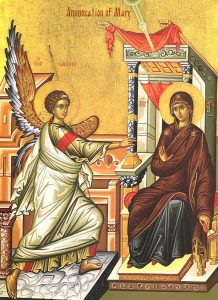 Annunciation of Mary, the Mother of God (Theotokos), March 25th
Annunciation of Mary, the Mother of God (Theotokos), March 25thThird Week of the Great Fast
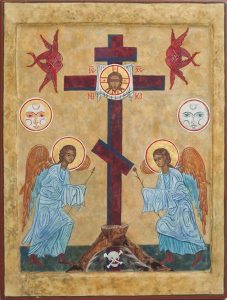 The first half of the Great Fast tells us the stories of Adam and Eve and their children, and the flood of Noah. It is a story of the creation of a perfect world and how that has been marred by human sin. It tells of the end of paradise, “The Lord God therefore banished him from the garden of Eden, to till the ground from which he had been taken. He expelled the man, stationing the cherubim and the fiery revolving sword east of the garden of Eden, to guard the way to the tree of life. (Genesis 3:23-24)” Today, however, begins a new story, and we sing, “No longer does the flaming sword guard the gates of Eden, for the tree of the cross has come to quench it wondrously. The sting of death and the victory of Hades have been driven out. For you, O my Savior, stood and called out to those in Hades: Enter again into paradise.”
The first half of the Great Fast tells us the stories of Adam and Eve and their children, and the flood of Noah. It is a story of the creation of a perfect world and how that has been marred by human sin. It tells of the end of paradise, “The Lord God therefore banished him from the garden of Eden, to till the ground from which he had been taken. He expelled the man, stationing the cherubim and the fiery revolving sword east of the garden of Eden, to guard the way to the tree of life. (Genesis 3:23-24)” Today, however, begins a new story, and we sing, “No longer does the flaming sword guard the gates of Eden, for the tree of the cross has come to quench it wondrously. The sting of death and the victory of Hades have been driven out. For you, O my Savior, stood and called out to those in Hades: Enter again into paradise.”
The tree of life, which Adam and Eve attempted to seize against the will of God, is the tree of the cross. And the fruit of this tree is the Body of Christ, which we receive in Holy Communion :for the forgiveness of sins and life everlasting.” We receive it together with his Holy Blood, “shed of the life of the world,” for today’s Gospel tells us, ““Whoever wishes to come after me must deny himself, take up his cross, and follow me.” (Mark 8:34) Today we understand the words of our Lord, “ “Amen, amen, I say to you, unless you eat the flesh of the Son of Man and drink his blood, you do not have life within you. (John 6:53)”
The Romans crucified thousands of people, many of whom were innocent. Yet of all these people, only our Lord Jesus Christ is remembered. This is because it is not the method of torture, nor the gruesome of his death that matters, but the infinite love that shone forth from his sacrifice on the cross. This is what is important for us, we may not have to die in such a painful or unjust way, but we do have to be united in the love that God shows forth on the cross. This is what it means “to take up the cross.” I personally think that for each and every one of us, it means denying for ourselves something that we crave very earnestly, a painful self-denial, if you will, for the sake of true deifying love for God and for others. This is why the cross, originally an instrument of torture and shame, has become for us the trophy of salvation. The joy of the Fast is that through God’s love we come to the fullness of life.